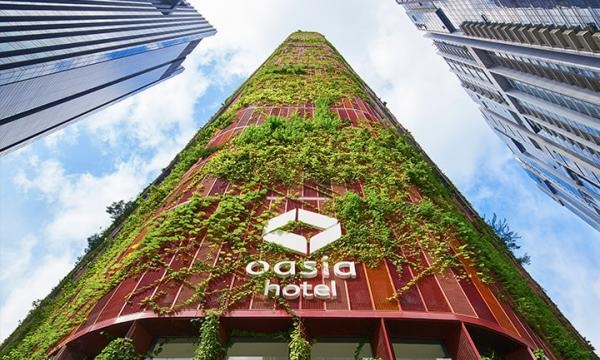
80% of building spaces to be eco-friendly by 2030: CBRE
More large firms like CapitaLand and Lendlease are offering green leases to tenants.
Majority of the gross floor area (GFA) stock in Singapore will be ‘green’ by 2030—that is, they will adapt energy and water efficiency methods integrated with green spaces and will be constructed using eco-friendly materials, real estate company CBRE reported.
As of April, 40% of the island’s GFA stock is certified green, according to data from the Building and Construction Authority (BCA). This number is expected to rise to 80% in the next eleven years.
The National Research Foundation also recently added another $20m to the initial $52m injected into the BCA’s Green Buildings Innovation Cluster (GBIC) programme in September.
CBRE observed that more large companies are opting to locate their operations in office and retail spaces within green buildings. Reports also said that more large corporations are pledging to achieve green building certifications for their owned and leased premises, including some financial institutions and consumer goods firms, the firm added.
Developers are also joining in the sustainability push by rolling out green leases where both landlords and tenants adopt eco-friendly practices. Under this type of lease, landlords share energy consumption data with tenants, with the aim of achieving a lower energy consumption rate collectively. Currently, CapitaLand and Lendlease offer these terms to some of their tenants in Bedok Mall, Bugis+, JCube, Junction 8, Westgate, 313@Somerset, Parkway Parade, and Jem.
“Whilst green leases are not prevalent in 2019, we expect such leases to be more common by 2030. BCA has been encouraging building owners to develop green leases as these leases contribute points to the scoring system in obtaining green mark certification. This could point to an emerging trend where tenants are more willing to participate in the green building movement,” noted CBRE.
Lower energy consumption also translates to overall cost savings, making the green movement ideal for both landlords and tenants alike. Aligned with the state’s push for buildings to achieve a minimum of 60% energy efficiency improvement over the 2005 building codes, this will result in the prevalence of super low energy (SLE) buildings by 2030, the report said.
Additionally, the average energy use intensity (EUI) is expected to remain below 100 kWh per sqm a year. “The continuous efforts in improving energy usage in Singapore is reflected by the declining EUI in Singapore office buildings, which has improved since 2012. The reduced EUI is an encouraging indicator; as despite the increase in office supply over the years, average EUI has declined. On a yearly basis, the average EUI declined by 4.3% to 221 kWh per sqm per year,” CBRE reported.
























 Advertise
Advertise






